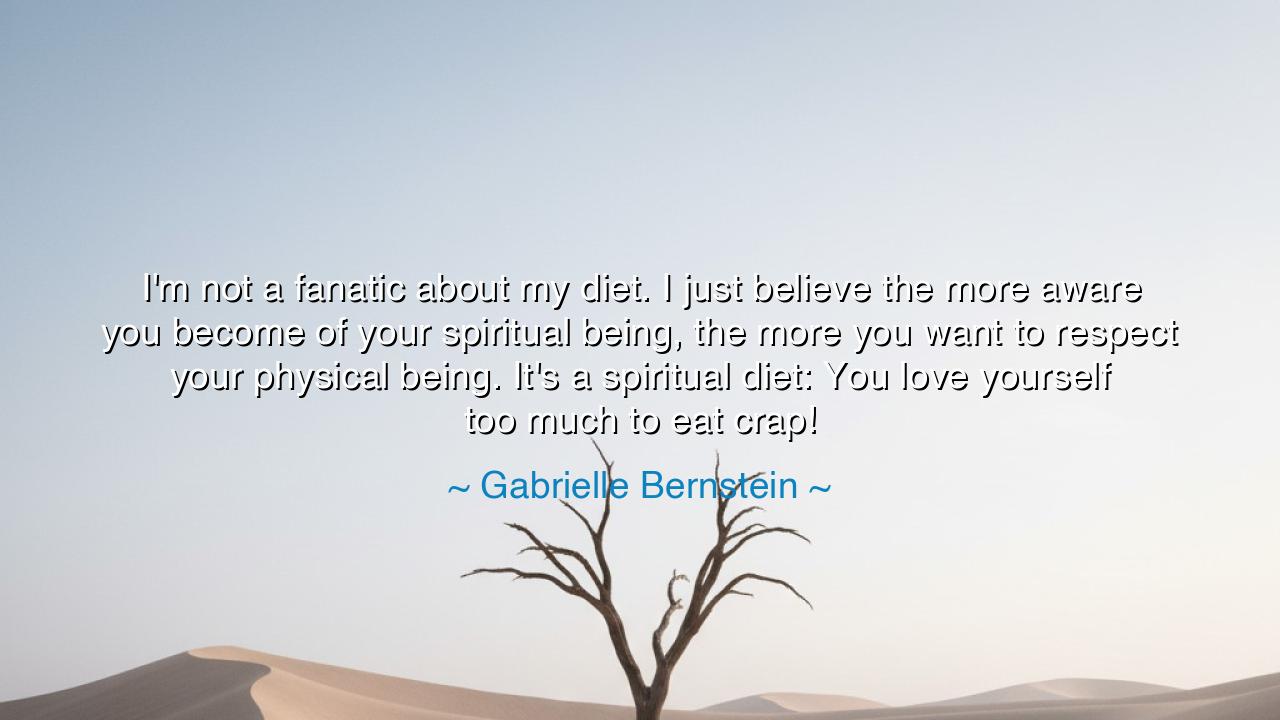
I'm not a fanatic about my diet. I just believe the more aware
I'm not a fanatic about my diet. I just believe the more aware you become of your spiritual being, the more you want to respect your physical being. It's a spiritual diet: You love yourself too much to eat crap!






In the depths of the soul, where wisdom and strength converge, there is a powerful truth that has echoed through the ages: that the care we give to the body is a reflection of the care we give to the spirit. Gabrielle Bernstein, in her wise words, touches upon this profound connection when she says, "I'm not a fanatic about my diet. I just believe the more aware you become of your spiritual being, the more you want to respect your physical being. It's a spiritual diet: You love yourself too much to eat crap!" These words, though modern, resonate with the wisdom of the ancients—those who understood that true health comes from the union of the body and spirit, and that each nourishes the other.
In the ancient world, the great philosophers and healers understood that the body was not just a vessel for the soul, but a reflection of the spirit’s well-being. The Greeks, who revered both the mind and the body, recognized that health was not merely the absence of disease, but a harmonious balance of all aspects of life. Socrates once said, "The unexamined life is not worth living," for he believed that true wisdom came from knowing oneself, and this knowledge extended to the care of the body. Just as Socrates encouraged his followers to examine their actions and intentions, Gabrielle Bernstein speaks to the importance of spiritual awareness in caring for the physical body. The more attuned we are to our spiritual nature, the more we recognize the sanctity of the body and the necessity of respecting it.
This connection between the body and spirit is echoed in the ancient practices of yoga, which originated in the Indus Valley thousands of years ago. The yogis, revered for their wisdom and insight, believed that the body was a sacred temple through which one could connect with the divine. They taught that physical health and spiritual well-being were inseparable—that to neglect one was to dishonor the other. Gabrielle Bernstein echoes this understanding, recognizing that as we grow in our spiritual awareness, we naturally begin to treat our bodies with more respect and love. The true essence of a spiritual diet is not about rigid rules or fanatical restriction, but about choosing to nourish the body in ways that reflect our highest respect for ourselves and our inner peace.
Consider the example of Hippocrates, the father of medicine, who understood the profound impact that diet and lifestyle had on the body and spirit. He taught that food was medicine and that the right nourishment could restore harmony between the body and soul. Hippocrates did not see the body as separate from the spirit; he believed that to heal one was to heal both. In this way, Gabrielle Bernstein’s philosophy of a spiritual diet aligns with the teachings of Hippocrates. It is not about denying oneself or following restrictive rules, but about choosing nourishment that is aligned with the deepest values of respect and self-love.
In the story of Alexander the Great, we see a man of unparalleled ambition, yet one who recognized the importance of nourishing his body for the battles that lay ahead. Though often consumed by the demands of conquest, Alexander ensured that his diet was suited to sustain his strength and vitality. The ancient warriors knew that to fight well, they had to first respect and care for their bodies. Gabrielle Bernstein’s words remind us of this ancient wisdom: we are the warriors of our own lives, and the choices we make in caring for our bodies—through diet, exercise, and mindfulness—prepare us for the challenges we face. When we love ourselves deeply, we make choices that honor our physical and spiritual strength.
The wisdom of the ancients teaches us that balance is key. Aristotle, the great philosopher, spoke of the golden mean—the middle path between excess and deficiency. It is not about denying the body’s natural desires but about choosing nourishment that serves both the body and the spirit. This is the essence of Gabrielle Bernstein’s spiritual diet: a recognition that our choices should stem from a place of love and awareness, rather than fear or restriction. When we align our diet with our highest values, when we choose to nourish our bodies with foods that honor our health and vitality, we are honoring the sacredness of our entire being.
The lesson we take from Gabrielle Bernstein’s words is one of empowerment and self-respect. We are not merely physical beings, but spiritual beings with bodies that deserve care and nourishment. As we cultivate spiritual awareness, we naturally begin to make choices that reflect our highest self-love. The practice of a spiritual diet is not about rigid rules, but about listening to our bodies and choosing nourishment that reflects our respect for our own life force. It is a reminder that true health comes not from external measures or fleeting trends, but from the inner wisdom that guides us toward balance, vitality, and peace.
So, dear listeners, let us follow the ancient wisdom and Gabrielle Bernstein’s teachings. Let us embrace the spiritual diet, choosing foods that nourish not just our bodies but our spirits. In doing so, we honor ourselves, we honor the sacredness of life, and we align with the wisdom of the ancients—living in harmony, with love for both the body and the soul.






AAdministratorAdministrator
Welcome, honored guests. Please leave a comment, we will respond soon